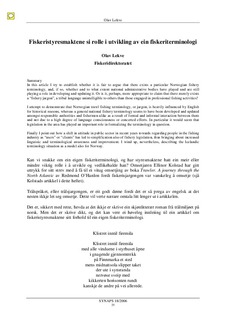| dc.description.abstract | In this article I try to establish whether it is fair to argue that there exists a particular Norwegian fishery
terminology, and, if so, whether and to what extent national administrative bodies have played and are still
playing a role in developing and updating it. Or is it, perhaps, more appropriate to claim that there merely exists
a “fishery jargon”, a tribal language unintelligible to others than those engaged in professional fishing activities?
I attempt to demonstrate that Norwegian trawl fishing terminology, or jargon, is heavily influenced by English
for historical reasons, whereas a general national fishery terminology seems to have been developed and updated
amongst responsible authorities and fishermen alike as a result of formal and informal interaction between them
and not due to a high degree of language consciousness or concerted efforts. In particular it would seem that
legislation in the area has played an important role in formalizing the terminology in question.
Finally I point out how a shift in attitude in public sector in recent years towards regarding people in the fishing
industry as “users” or “clients” has led to simplification also of fishery legislation, thus bringing about increased
linguistic and terminological awareness and improvement. I wind up, nevertheless, describing the Icelandic
terminology situation as a model also for Norway. | nb_NO |
